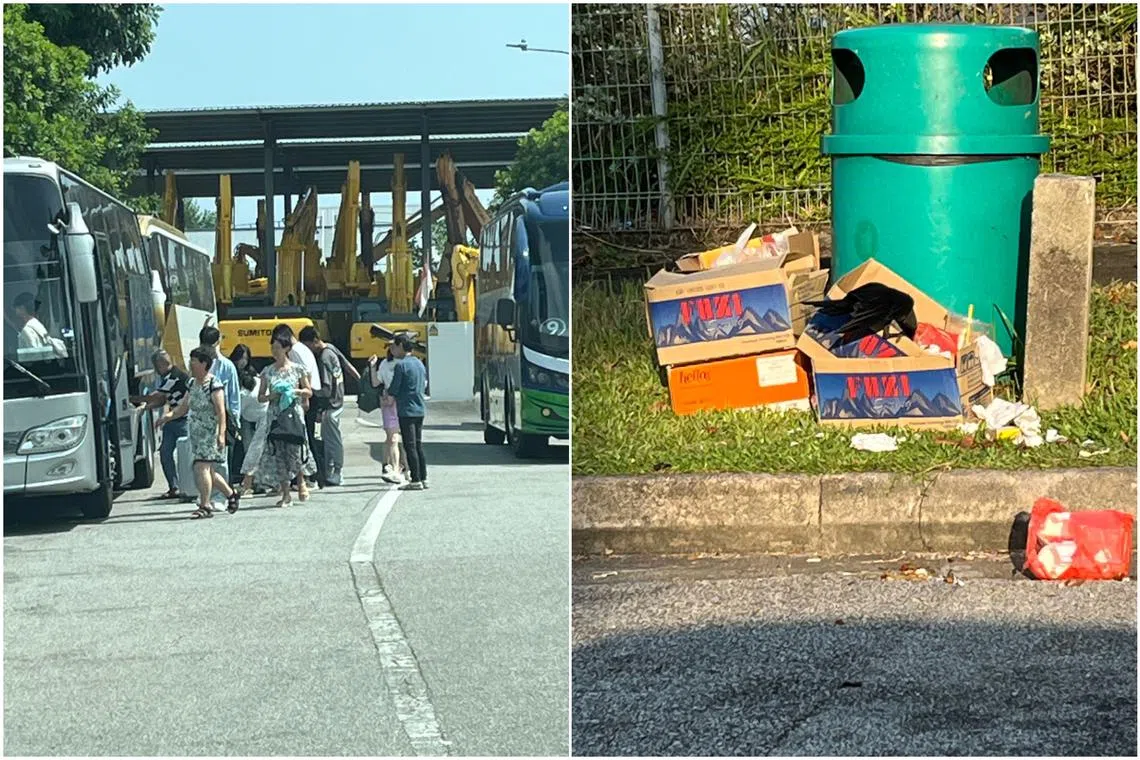‘Tour bus interchange’ in Tuas: LTA warns action will be taken for illegal parking
Sign up now: Get ST's newsletters delivered to your inbox

When the tourists moved from one bus to another, some of them left behind rubbish in the area, attracting many crows.
PHOTOS: SIA KEOK MUIE
SINGAPORE – Tour buses parked illegally along the road in Tuas at a makeshift bus interchange that has become a nuisance to nearby businesses will face action, the Land Transport Authority (LTA) said.
In response to queries, LTA said motorists who flout traffic rules and pose a danger to others will be taken to task.
A spokesman on Aug 19 said: “LTA takes a serious view towards excursion buses that park illegally along roads, as it may impede traffic flow, pose safety risks to other road users and cause disamenities to the community.
“We will continue to take action against motorists who do not comply with traffic regulations.”
A number of businesses in Tuas Link 2 raised concerns about large coaches that ferry tourists from Malaysia to Singapore.
According to media reports, the buses blocked the entrances to the premises of businesses, and created traffic jams in the area.
The tourists also reportedly relieved themselves in the open and left a trail of rubbish behind.
In a Facebook post on Aug 7, LTA said 25 tour buses and coaches were booked for illegal parking offences around Tuas Link 2 during a joint enforcement operation with the National Environment Agency.
Mr Sia Keok Muie, managing director of heavy machinery supplier Sia & Yeo Heavy Equipment located in Tuas Link 2, said the tour buses obstructed the roads outside his company before the latest enforcement action.
When the tourists moved from one bus to another, some of them left behind rubbish in the area, attracting many crows, he said, adding that there were tourists who also urinated by the roadside.
“But we’re happy that after local media reported on this issue, the government agencies came down to enforce the rules and the tour buses no longer stop in this area,” Mr Sia added.
Mr Dominic Ong, chairman of the National Association of Travel Agents Singapore’s inbound and surface transport, told ST that Tuas Link 2 had become an informal bus transfer zone for tourists travelling from Kuala Lumpur to Singapore over a decade ago.
The Malaysian coaches would drop the tourists off at this area, which is just 15 minutes away from the Tuas Checkpoint, before the Singapore coaches pick them up for transfer to Changi Airport, he said.
“The Malaysian drivers are on the road for six to eight hours,” Mr Ong said, adding that it is better for them to drop passengers off at Tuas Link 2 so they can “turn around and return to Malaysia without tiring themselves further”.
Unlike Woodlands Checkpoint, which has a dedicated transfer area designed to manage the flow of passengers entering Singapore from Malaysia in coaches and other vehicles, such a facility is not yet in place in Tuas.
Tour operators hence made use of Tuas Link 2 as a de facto transfer zone due to its convenience.
“Unfortunately, this was done without any formal infrastructure being put in place,” Mr Ong said.
Mr Ong, who is also managing director of travel agent Tour East Singapore, said the informal transfer area is not ideal for travellers.
His team is keen to explore a long-term solution with the relevant authorities to establish a dedicated transfer area.
He said the “best scenario” is to have a “proper bus terminal equivalent to the Singapore Cruise Centre and airport terminal”, one that has a centralised building with ticket sales counters, a foodcourt, restrooms, and ample parking space for arriving, receiving and departing buses and vans.
“We are hopeful that these plans will come to fruition soon,” Mr Ong said.
The Singapore Tourism Board (STB) told ST on Aug 19 it is working with the relevant agencies to find longer-term alternative arrangements for visitors who enter Singapore via tour bus companies.
“STB is concerned about the situation and is acutely aware of the potential negative impact that such incidents can cause. The safety and well-being of locals and tourists are of utmost importance to us,” said a spokesperson.



